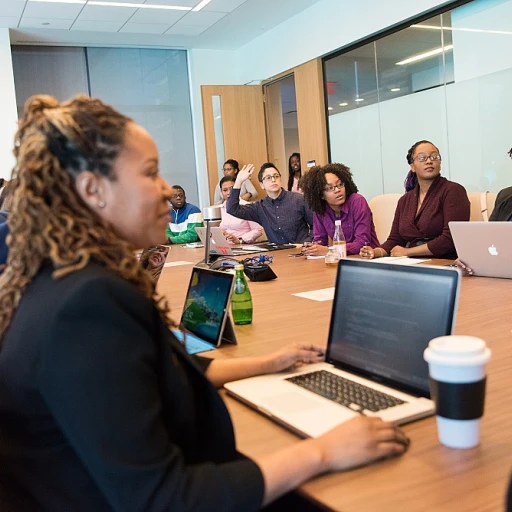
Understanding the Role of Coaching in DEI
The Role of Coaching in Enhancing Diversity and Inclusion
In today's diverse workplace, the importance of diversity, equity, and inclusion (DEI) initiatives cannot be overstated. Coaching offers a powerful way to bolster these efforts by fostering an inclusive culture and enhancing leadership capabilities. Leaders and coaches can play a pivotal role in driving DEI changes by embedding inclusive leadership qualities into their teams, promoting growth and development among all employees. Through intentional leadership coaching, organizations can help build a workplace where everyone feels valued, resulting in higher employee engagement and retention.
Coaching enables leaders to truly understand and implement diversity and equity initiatives within their organizations. A diverse and inclusive workplace culture is not only more innovative but also more adaptable to change. Leaders equipped with strong DEI coaching insights can effectively navigate the challenges of creating and maintaining an inclusive environment. By enhancing decision-making processes and promoting inclusion and belonging, coach-led DEI training can significantly contribute to an inclusive workplace.
Diverse teams benefit from coaching that focuses on equity inclusion and employee engagement. These initiatives are crucial in ensuring employees feel recognized and supported within the organization. By championing a work culture that prioritizes mental health and inclusive practices, leaders can set the stage for sustainable retention strategies.
For in-depth insights into how peer-inclusive performance appraisals can further support DEI goals, you may find this resource helpful. It offers a comprehensive look at how transparency and inclusion in feedback mechanisms foster a culture of trust and development.
The Impact of DEI on Employee Retention
Power of DEI in Enhancing Employee Commitment
In evaluating the interplay between diversity, equity, and inclusion (DEI) and employee retention, it's essential to comprehend how DEI strategies translate into increased job satisfaction and loyalty among employees. Creating a diverse workplace is not just about meeting quotas; it actively shapes a culture where all team members feel valued, connected, and empowered to contribute their unique perspectives.
When an organization invests in DEI initiatives, it generates a ripple effect throughout the company. Leadership coaching becomes a vital tool in this process. By nurturing inclusive leadership, DEI training equips leaders to recognize the diverse talents within their teams and promote an environment of collaboration and respect. As a result, employees feel appreciated and understood, reducing turnover rates and improving overall engagement.
Impact on Leadership and Decision-Making
Incorporating DEI into decision-making processes ensures that choices made within the organization reflect the diverse viewpoints of its workforce, leading to more innovative solutions. This alignment between leadership and a supportive workplace culture drives employee retention, as individuals are more likely to remain in environments where their input is acknowledged and valued.
Moreover, the support provided by coaches dedicated to DEI plays a crucial role in although they may encounter challenges in implementation, the commitment to fostering an inclusive workplace stimulates employee development and growth. These DEI-focused efforts aren't merely theoretical; they actively reshape the work environment, paving the way for sustainable retention of a diverse team.
By addressing inclusivity challenges head-on, DEI coaching contributes to both the mental health and professional development of the workforce, reinforcing a sense of belonging and purpose in the workplace. For more insights on DEI strategies that improve retention, explore how coaching can differentiate from more traditional management approaches here.
Coaching Strategies for Enhancing DEI
Coaching as a Catalyst for DEI Commitment
An effective coaching program can significantly amplify diversity, equity, and inclusion (DEI) efforts by fostering an inclusive workplace culture and enhancing leadership development. By supporting leaders and teams, coaching provides the necessary framework for promoting DEI initiatives in the workplace.
Coaching help leaders recognize and tackle the unconscious biases that may permeate their decision making. This awareness empowers them to create a more inclusive culture that supports diverse teams and encourages equity inclusion. Inclusive leadership, in turn, enhances employee engagement and ensures that employees feel valued and heard.
Tailored Coaching Strategies
- DEI Training Sessions: Coaches can offer targeted training sessions that focus on diverse challenges in the workplace. These sessions help employees understand the importance of inclusion and equip them with the tools to promote inclusion belonging among their peers.
- Leadership Coaching: An emphasis on leadership coaching ensures that leaders are prepared to champion DEI initiatives effectively. Through personalized development plans, leaders learn to become advocates for diversity equity in their organization's culture.
- Team-Based Coaching: Coaches can work with teams to enhance their understanding of inclusive practices, enabling them to contribute positively to the workplace culture. By prioritizing an inclusive environment, teams can achieve higher productivity and innovation.
Incorporating these strategies within coaching can truly set the stage for successful DEI initiatives. Notably, the key strategies for selecting and retaining top talent are essential to nurturing a diversified workforce and sustaining an engaged workplace community.
Challenges in Implementing DEI-Focused Coaching
Overcoming Barriers to Implementing Coaching for DEI
Implementing coaching strategies focused on diversity, equity, and inclusion (DEI) in the workplace is a crucial step towards fostering an inclusive culture. However, organizations often face significant challenges in this process. Understanding these challenges is key to developing effective approaches that achieve the desired impact on employee retention.
One major challenge is resistance to change. Many leaders and employees may be accustomed to the existing workplace culture and hesitant to embrace new DEI initiatives. This resistance can be rooted in fear of the unknown or discomfort with changing long-standing practices. To overcome this, transparent communication and inclusive leadership are essential. Leadership coaching can support leaders in embracing DEI principles, helping them to lead by example and influence the rest of the organization positively.
Another challenge is the lack of expertise or resources dedicated to DEI efforts. Without proper guidance from skilled DEI coaches, organizations may struggle to develop tailored strategies that address their unique needs. Investing in professional development for both leaders and employees through specialized DEI training programs can bridge this gap, offering knowledge that enhances the overall DEI initiatives.
Ensuring accountability and consistency in DEI coaching is also paramount. Organizations need to establish clear metrics and regular evaluations to measure the progress of their initiatives. This continuous assessment can identify areas for improvement and reinforce the commitment to building a more inclusive workplace.
Lastly, balancing the focus on DEI with other organizational priorities can present a challenge. Aligning DEI goals with the company's overarching mission helps integrate equity inclusion into all aspects of the business, promoting sustained employee engagement and belonging. By addressing these challenges thoughtfully, organizations can create a workplace where all employees feel valued and supported.
Case Studies: Successful DEI Coaching Programs
Real-Life Examples of DEI Coaching Success
Diversity, equity, and inclusion (DEI) coaching programs can significantly enhance workplace culture and employee retention when successfully implemented. Real-world examples demonstrate how impactful these initiatives can be when tailored to organizational needs and guided by leadership development goals. Let's explore some notable case studies where DEI coaching has proven effective.
Enhancing Inclusive Leadership: In government institutions, a commitment to inclusive leadership has seen positive transformations. A specific organization was struggling with low employee engagement due to an outdated view of diversity inclusion. By introducing DEI-focused coaching, leaders received personalized development and training on equity inclusion principles, fostering a more inclusive workplace. The results were seen in improved decision-making processes and employees feeling more valued, ultimately reducing turnover rates.
Building Supportive Team Dynamics: In the tech industry, one company utilized DEI coaching to uplift its workplace culture. Coaches worked closely with department heads to identify and address challenges unique to their teams. Focusing on inclusion and belonging, the company established channels for diverse employees to voice concerns and contribute to initiatives. This support system enhanced team dynamics, showcasing how DEI coaching helps improve not only retention but also creativity and innovation.
Nurturing Diverse Talent: In the healthcare sector, an organization recognized the need for a comprehensive DEI workplace transformation. By adopting leadership coaching tailored to diverse talent, they equipped senior leaders with the tools to nurture equity and inclusion. The initiative saw the emergence of a diverse and talented pool of leaders ready to inspire and uplift fellow employees, leading to sustained employee satisfaction and reduced turnover in the long term.
These successful programs highlight the importance of dedicated DEI coaches and comprehensive training. They showcase how organizations that embrace diversity equity, inclusive leadership, and tailored development initiatives can build a strong, cohesive workplace environment that positively impacts employee retention.
Measuring the Success of DEI Initiatives in Retention
Evaluating Positive Change in the Workplace
Measuring the success of diversity, equity, and inclusion (DEI) initiatives in employee retention is vital for ensuring the sustainability and growth of an inclusive workplace culture. Leaders and organizations need mechanisms to evaluate how DEI-focused coaching efforts are impacting employee engagement and retention metrics.Key Metrics for Success
The evaluation of DEI initiatives can hinge on several crucial metrics:- Retention Rates: Changes in turnover rates can reveal the effectiveness of DEI strategies. A reduction in turnover can signify that employees feel more included and valued.
- Employee Surveys: Regular, anonymous feedback mechanisms can indicate the success of inclusive leadership and equity initiatives. Surveys often highlight how employees feel about their workplace culture and belonging.
- Performance Metrics: Monitoring team productivity and innovation can provide insights into how diversity inclusion contributes to better decision-making and problem-solving in a diverse workforce.
- Diverse Leadership Representation: The growth in leadership diversity can reflect the effectiveness of leadership coaching tailored towards fostering an inclusive workplace.
Acknowledging the Challenges
Despite the clear metrics, challenges in accurately measuring DEI success are prevalent. Organizational biases can lead to skewed data on the impact of DEI coaching. Moreover, mental health considerations can also influence employee sentiment and retention. Thus, companies must adopt a holistic approach to measure and understand these nuanced dynamics.Using Data to Foster Continued Improvement
Successful DEI coaching programs are not static; they evolve based on comprehensive data analyses. Organizations should continuously refine strategies by:- Frequent Data Analysis: Regular reviews of engagement and retention statistics can pinpoint areas for further development and adjustment.
- Tailored Training Programs: Customizing DEI training to reflect the diverse needs of teams and recognizing diverse cultural backgrounds can enhance employee engagement.
- Leadership Development Initiatives: Investing in leadership coaching can foster inclusive leadership that supports a thriving workplace culture.













